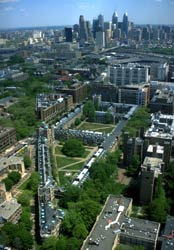

Believe it or not, I am an on-again, off-again member of the Sierra Club. My reasons are mercenary: membership usually comes with some nice schwag, and I get to read their monthly magazine for a year. The rag is good for getting the far-left green perspective, which I sometimes take in and sometimes roll my eyes over.
One recent eye-roller was its ranking of most sustainable colleges. Many of its campuses reflect the sort of imagery you'd expect of a Sierra Club publication: bucolic, grassy, near to nature. I for one did not even know that such places existed as Green Mountain College (#2) or Evergreen State College (#9).
Of course I looked for my alma mater, Penn, and was disappointed, on two fronts, to see it only at #21. Disappointed first because I want my school to rank high, but disappointed also that the Sierra Club didn't seem to take into account the inherent sustainability of dense urban campuses like Penn or NYU (#28) or Pitt (#52).
It may seem cheating to be green by doing nothing, but setting really does make a huge difference. I will bet you that the body-to-parking-spot ratio at Penn, NYU, and Pitt is a fifth to a tenth of that of most of the schools ranked ahead of them. And that matters. For schools are huge hives of activity, what with students and faculty and administrators and janitors and athletes and attendees coming and going. If almost every trip in these so-called green schools happens by car, and almost every trip at Penn, NYU, and Pitt happens by foot, bike, or public transit, you tell me who's practicing a more environmentally sustainable way of existing.
To be sure, people drive to and from Penn, NYU, and Pitt. And I'm sure a lot of people ride their bikes at Green Mountain College and Evergreen State College. But the difference in mode split is probably pretty stark. Without trying, schools in dense urban settings necessarily are greener than those in scenic natural settings. Too bad the Sierra Club missed an opportunity to state the obvious, and instead reinforced a not-quite-right stereotype.


No comments:
Post a Comment